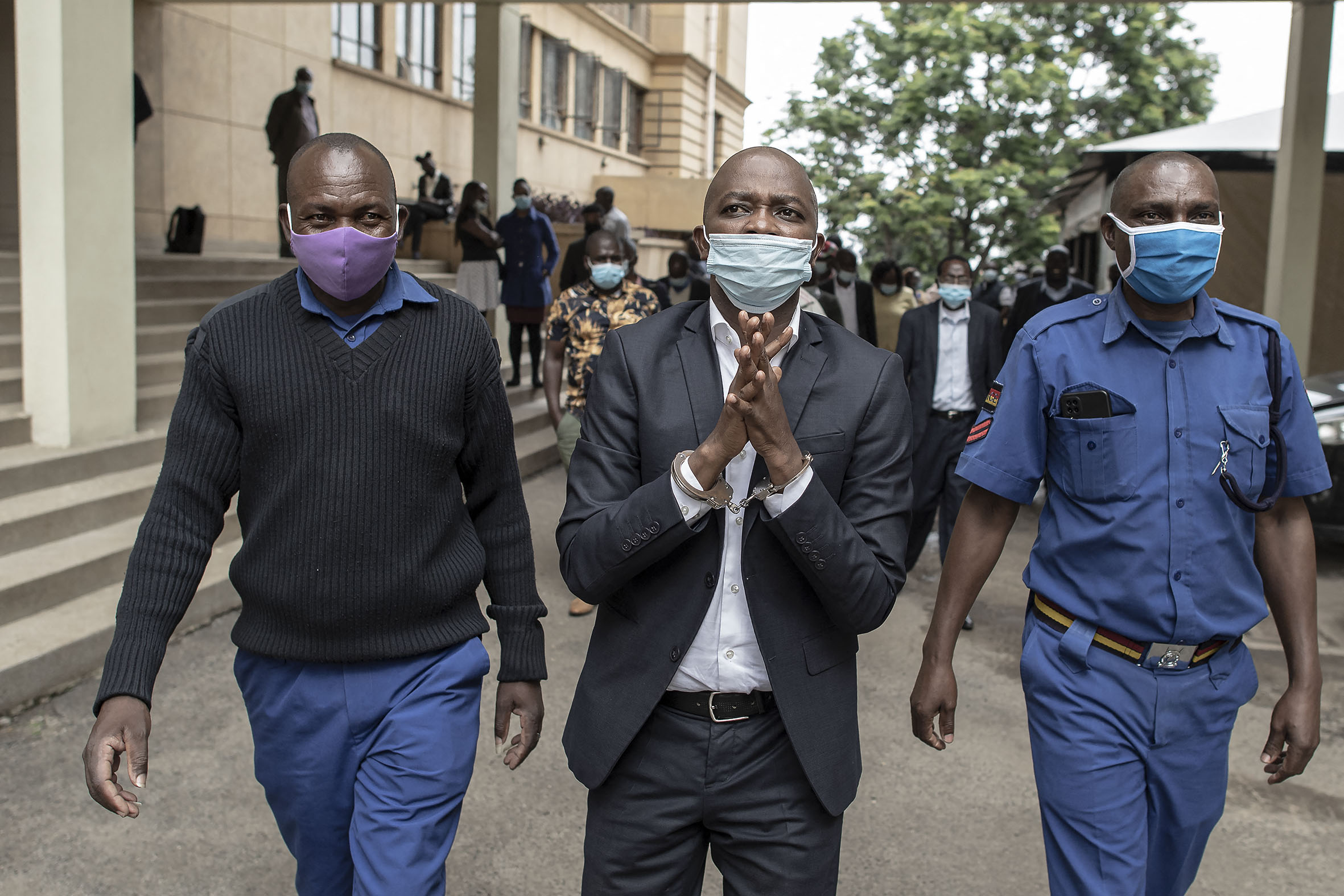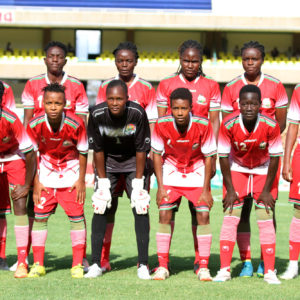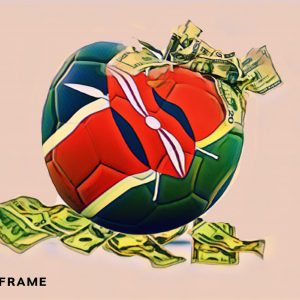The making and breaking of Nick Mwendwa
The president of Kenya’s football federation officially left office at the end of November. But the dark clouds that have followed him still cast their shadow on the sport in the country.
Author:
21 May 2022

“I can’t say that Nick Mwendwa was a victim of his success, but rather [he was] a product of his failures,” said award-winning journalist Mutwiri Mutuota on the rise and fall of the former president of the Football Kenya Federation (FKF).
Mwendwa faced multiple counts of fraud as part of a group who allegedly embezzled 38 million Kenyan shillings (about R5.3 million) in funds the government and sponsors had channelled to the FKF for running the national teams. He was suspended from office just a few months after he had secured a historic second term in 2020 and formally stepped down in December 2021. The charges against him were dropped in court in late November but were reinstated in early December.
His rise to power four years before this scandal blew up had been meteoric. At 36 he became the youngest president of the FKF, replacing the beleaguered Sam Nyamweya, a long-serving administrator who had turned Kenyan football into a laughing stock through his chaotic and scandalous management.
So tired were fans with how Nyamweya handled the Harambee Stars, Kenya’s senior men’s national football team, that it sparked a national outrage when the side almost missed a 2018 Fifa World Cup-qualifying return match against Cape Verde in Praia. After a hard-fought first leg win in Nairobi, they only arrived on match day because of shambolic logistics planning. Nyamweya was eventually arrested for alleged corruption and quit the election race at the eleventh hour. It was reportedly a trade-off with authorities for his freedom and the charges against him were never pursued.
Related article:
Riding on the ever popular “change” slogan and with a seamless and well-oiled campaign machine that milked the media for publicity, Mwendwa’s stars were perfectly aligned and there was no stopping him. His sole challenger on election day, Ambrose Rachier, was no match and Mwendwa won the elections.
He assumed office with many lofty promises to fulfil, including sending Kenya to their first World Cup in Qatar. But it did not take long before his leadership style, which some found abrasive, if not dictatorial, came under scrutiny. “As soon as he came to power it got into his head, and he forgot that being president does not mean that everything you do or say or everything you ask people to do or all your opinions are right,” said Mutuota.
Mwendwa forced the Kenyan Premier League (KPL) to expand from 16 to 18 clubs. “He assumed tendencies whereby he believed he was going to change Kenyan football his way and no other way,” said Mutuota. The move proved ill-advised as it came at a time that pay-television giant SuperSport was mooting an exit plan. Mwendwa’s breach of contract gave the station a reason to end its partnership of more than a decade. The league is yet to secure a better broadcaster.
Acolytes and adversity
As he entrenched himself, and with the solid backing of an executive team that never publicly questioned his actions, Mwendwa increasingly became averse to criticism. Members of the fourth estate perceived to be too critical of the FKF were denied access to stadiums or its functions and some were alleged to have been threatened with physical harm by unknown individuals.
“Even when my back is bent from old age, I doubt I will ever forget the countless instances when I suffered on an individual level during Mwendwa’s tenure because of my job as a journalist,” wrote reporter Cellestine Olilo in a scathing article she penned for the Daily Nation. “I won’t even talk about the countless times Mwendwa has sent individuals to my bosses to try and engineer my sacking.”
As stated by Sally Bolo, a sports entrepreneur and former treasurer of multiple Kenyan champions Gor Mahia, Mwendwa’s Achilles heel was surrounding himself with a group of acolytes who seldom questioned his ways. “His leadership needed not only loyalists, but also firm visionaries who could politely say no to him when necessary,” she said.
Related article:
Mwendwa’s biggest blunder, added Bolo, was to be at loggerheads with the two most decorated clubs in Kenya, Gor Mahia and AFC Leopards, and also the government. The clubs boast sympathisers in high places, and it is generally agreed that one must appease them without necessarily favouring them. It’s a delicate balancing act that Mwendwa seems to have failed to master.
When the two clubs agreed not to play in protest against unpaid league grants, Mwendwa responded by slapping them with a staggering fine. The fact that he had been the chairperson of KPL club Kariobangi Sharks at one point led to constant accusations, which he dismissed, of favouring the club while oppressing others.
“He had little regard for the big community clubs and also did not do much to nurture and sustain a cordial relationship with the government. This was his downfall,” said Bolo.
Crime, not politics
Others say Mwendwa’s political leanings towards Deputy President William Ruto, who has had a frosty relationship with President Uhuru Kenyatta over his ambition of succeeding him, is to blame for his fall. But Lordvick Aduda, a candidate in the 2020 FKF presidential race, disagreed. “He does not command any meaningful political constituency to warrant being persecuted for his associations. No way that could have contributed to his ouster,” Aduda said. “It must be understood clearly that Mwendwa was removed from office because of the criminal nature of the charges that were against him after the audit.”
Aduda said that the Cabinet secretary for sports, heritage and culture, Amina Mohamed, acted within Kenyan law to disband the FKF executive following a recommendation of an audit report. Mohamed also formed an interim committee to run the federation’s affairs for a period of six months. Her actions led to world-governing body Fifa banning Kenya because of government interference, but Aduda said she was justified in doing what she did, though Fifa’s laws should have been considered.
Under the Sports Act of 2013, to which all sporting bodies subscribe, a Cabinet secretary or the minister of sport can order an audit in the case of allegations or suspicions of mismanagement or embezzlement. “It is one thing to operate within the confines of Kenyan laws, but it’s also important to synchronise them with international [Fifa] laws, without which expect chaos,” said Aduda.
Some good things did come from Mwendwa’s tenure. He relocated the FKF’s offices to Kandanda House, a Fifa Goal Project that had been abandoned earlier. The Harambee Starlets, the women’s national senior team, and their men’s counterparts both qualified for their respective Africa Cup of Nations (Afcon). The training of match officials and coaches also improved.
Related article:
However, Mwendwa saying during a television show in 2021 that Kenya lacks the quality to compete at the level of Mali ignited a serious backlash, with current and former players condemning him. The ill-timed comment came against the backdrop of the Harambee Stars’ elimination from the qualifiers for the 2021 Afcon after losing 6-0 on aggregate to the West Africans.
“This is an insult and disrespect to the current, former and all upcoming footballers who have continuously suffered playing under his reign,” said former Inter Milan midfielder McDonald Mariga shortly after. “The players have shown immense pride and patriotism to represent the Kenyan flag in various international assignments and this is what they get in return. For seven years under his leadership, football in Kenya has gone backwards and made no progress whatsoever, and for that we demand his immediate apology and resignation as FKF boss.”
Supporters of Mwendwa believe he is the victim of a witch-hunt. “Mwendwa has done nothing wrong,” said coach Dennis Hamisi, who is known within football circles for his undying support for the former administrator. “The government had their own people they wanted in office, but they lost at the ballot.”
He questioned why Fifa, which gives the FKF more funding than the government, has never complained of embezzlement at Kandanda House. Mwendwa is equally adamant that he is innocent and as he battles to clear his name, the future of Kenya remains in limbo.



